The World Bank’s recent call for a forensic audit of the Nigerian National Petroleum Company Limited (NNPCL) has sparked debate over the institution’s role in Nigeria’s economic affairs. While the Bank cites concerns over transparency and accountability, critics argue that its influence over Nigeria’s economic policies has led to harsh consequences for ordinary Nigerians, raising questions about the Bank’s moral authority and Nigeria’s sovereingnty.
While the Bank pushes for transparency, Nigeria’s sovereignty and the true beneficiaries of such interventions remain contested, especially given the social costs of policies like subsidy removal and currency devaluation imposed under external pressure.
The World Bank recently reiterated its call for a forensic audit of the Nigerian National Petroleum Company Limited (NNPCL), highlighting concerns over declining oil revenue remittances despite the official removal of fuel subsidies in October 2024.
In its May 2025 Nigeria Development Update, the World Bank noted that NNPCL’s contributions to the Federation Accounts Allocation Committee (FAAC) fell sharply from ₦500 billion in 2023 to ₦300 billion in 2024, with dividends from Persons with Significant Control also halving within the same period. The Bank criticised the opacity in NNPCL’s financial reporting, ranking Nigeria as “weak” in transparency and accountability concerning oil revenues and financial obligations between NNPCL and the Federation. It urged the Nigerian government to undertake a comprehensive forensic audit and implement standardised reporting to the FAAC to address these issues and ensure full remittance of subsidy savings for sound fiscal management.
World Bank’s Consistent Call
This is not the first time the World Bank has raised such concerns. Over the years, it has consistently highlighted the lack of transparency and accountability in NNPCL’s operations, including a 2024 report that called for reforms to improve reporting, prevent petrol price manipulation, and eliminate foreign exchange subsidies. In response to these persistent calls, Nigeria’s Minister of Finance, Wale Edun, has announced that a forensic audit of NNPCL is underway as part of broader efforts to restore confidence, reconcile accounts, and strengthen governance in the oil sector amid growing public scrutiny and demands for accountability.
Recall that the full removal of Nigeria’s fuel subsidy officially took place in October 2024. Although the process began gradually after President Bola Tinubu’s announcement in May 2023 that the subsidy was gone, the final and complete deregulation of fuel prices was implemented in October 2024, marking a significant shift in the country’s oil sector. This removal led to a sharp rise in petrol prices, more than doubling in some areas, and contributed to inflation reaching over 32% by late 2024
What is a Forensic audit?
A forensic audit is a detailed examination and evaluation of an individual’s or organisation’s financial records to uncover evidence of fraud, embezzlement, or other financial crimes that can be used in court or legal proceedings. Unlike a regular financial audit, which focuses on accuracy and compliance, a forensic audit is specifically designed to detect illegal activities and prepare evidence that may be presented in a trial.
Forensic audits are conducted by specialised professionals known as forensic auditors or forensic accountants, who have expertise in accounting, auditing, and legal frameworks. These experts often work within large commercial accounting firms or as Certified Fraud Examiners (CFEs). The evidence they gather must be thorough and legally admissible, ensuring clarity for judges and juries during court proceedings. In this context, it then means that the World Bank wants the NNPCL’s financial activities to be investigated.
On what pedestal is the World Bank is making this call
The World Bank’s recent call for a forensic audit of the Nigerian National Petroleum Company Limited (NNPCL) is grounded in its broader mandate to support Nigeria’s macroeconomic stability and inclusive growth, as outlined in its May 2025 Nigeria Development Update (NDU). The Bank recognises that while Nigeria has made significant progress through major reforms-such as the removal of petrol subsidies and foreign exchange market adjustments-persistent challenges remain, including weak transparency and accountability in key sectors like oil revenue management.
The Bank’s call might seem to align with its role as a global development institution providing technical advice and financial support to help Nigeria accelerate growth, reduce poverty, and improve governance. It is then crucial to ask if the World Bank will lose anything if the NNPCL remittances continue to fall.
The Bank’s role is to support Nigeria’s macroeconomic stability, poverty reduction, and inclusive growth through financial aid, technical assistance, and policy advice. Nigeria joined the World Bank in 1961 after its independence, but holds only a small share compared to major shareholders like the United States, Japan, Germany, France, and the United Kingdom, who have the largest voting power and appoint their own Executive Directors.
It is however crucial to also ask how much help, with clear positive results that the World Bank has given to Nigeria in power supply, local oil refining, insecurity, attacks against farmers, election rigging and imposition of inept leaders.
The World Bank has provided substantial financial and technical support to Nigeria’s power sector, local energy access, and renewable projects, with mixed but notable positive outcomes. Between 2020 and 2023, the report showed that the Bank approved over $2 billion in financing to support Nigeria’s Power Sector Recovery Program, aiming to improve electricity supply reliability, fiscal sustainability, and transparency.
Through the Nigeria Electrification Project (NEP), funded partly by the World Bank, they claimed over 7 million Nigerians have gained access to renewable energy via solar mini-grids and off-grid solutions. The recent $750 million DARES project aims to provide clean electricity access to 17.5 million more Nigerians, focusing on rural and underserved communities, supporting small businesses, and reducing reliance on polluting generators.
In all, where are all the help going because Nigerians continue to lament high power tariff.
How about the delays in major transmission projects, such as the Siemens Energy contract, which have pushed infrastructure upgrades to 2030, slowing progress? While some reforms continued to cause higher electricity tariffs, which have been criticised for increasing costs for consumers amid economic hardship.
Regarding insecurity, attacks on farmers, election rigging, and imposition of inept leaders, there is no direct evidence that the World Bank has provided targeted assistance or achieved clear positive results in these politically sensitive and security-related areas.
So, why is the World Bank the one raising questions about the removal of fuel subsidies and the continued decline in NNPCL remittances, even though it has nothing to lose directly?
It cannot even effectively monitor Nigeria’s elections or speak out on the truth when the masses need it most. Since the type of government in power largely determines how well state resources and infrastructure are managed, why is the World Bank so concerned about NNPC’s mismanagement of funds? Is there some indirect benefit they gain that Nigerians are unaware of? These questions reflect widespread scepticism about the role of international financial institutions in Nigeria’s economic affairs, especially given criticisms that the World Bank and IMF have influenced harsh economic policies like subsidy removal, which have often increased hardship for ordinary Nigerians.
According to a statement made by the Nigeria Labour Congress (NLC) in October 2024, “The IMF and its cousin in economic mischief – the World Bank remains the twin forces that have longstanding pattern of recommending harsh and unworkable Economic policies to developing nations,” NLC said in the statement signed by Joe Ajaero, the NLC President.”
Stinking corruption in NNPCL
The Nigerian National Petroleum Company Limited (NNPCL) has long been plagued by deep-rooted corruption, with recent revelations highlighting a staggering N500 billion shortfall in remittances to the Federation Account between October and December 2024.
This missing revenue, uncovered in a World Bank report, underscores systemic lapses in transparency and accountability within NNPCL, which ordinary Nigerians pay for through underdevelopment and poor public services.
Corruption at NNPCL is not isolated but entrenched, involving past leadership and political appointees, with reports of billions of naira found in illicit accounts and a culture of impunity stretching over decades. But 8. Do the IMF and World Bank have the moral right to poke into the affairs of the NNPCL?
Has Nigeria ever advocated for reforms in Western countries?
No. Rather, it is itself subject to policy prescriptions from these countries and its institutions. For example, the US recently withdrew from some international aid programmes benefiting Nigeria without facing similar scrutiny or demands from these bodies. This highlights a double standard in how international financial institutions engage with developing countries versus wealthy nations.
Dr Mbamalu, a Jefferson Journalism Fellow, member of the Nigerian Guild of Edirors and Media Consultant, is the publisher of Prime Business Africa*





